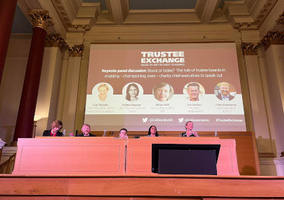The Charity Commission has told trustees not to “weaponise” the regulator in internal charity disputes.
Speaking at Civil Society Media’s Trustee Exchange yesterday, Helen Stephenson said she sees too many cases that revolve around “two or more warring parties with differing visions for the future of the charity”.
“Don’t try to weaponise the Commission as a tactic in a quarrel with fellow trustees,” she said.
“And don’t assume that by coming to the Commission as one party to a dispute, you’ll achieve the outcome you hope for.
“There’s no guarantee that we’ll ‘side’ with you – indeed intractable disputes can cause us to take other types of regulatory action in response to governance failures that arise.
“I’ve asked my colleagues at the Commission to undertake some work so that we better understand the scale and nature of disputes in charities, and can support trustees to stop small differences escalating into chaos.”
‘Use your passion to bring people together’
The Commission recently ordered the Actors’ Benevolent Fund to hold a second annual general meeting (AGM) after a “breach in the process” of its latest trustee election.
Stephenson did not name any particular charity but said disputes often revolve around who the “rightly appointed trustees actually are” and that arguments like this should be resolved internally instead of being referred to the regulator.
She said such arguments “might have been settled, had trustees shown goodwill and commitment, and a willingness to compromise their position”.
“These arguments should not land at our front door. We have a role in promoting public trust in charities and upholding the law. But it’s not our job to mediate between, or indeed pick sides between rival groups of trustees,” she said.
Stephenson said that the challenging climate for charities due to the pandemic and cost-of-living crisis could be what has led to “cracks in relationships”.
“I also suspect it perhaps has something to do with the passion and energy that so many trustees bring to their work. Occasionally, that energy can lead to fixed mindsets and a determination to be right at all costs,” she said.
“Please don’t allow that to happen in your charity. Use your passion to bring people together in the interests of those your charity exists to serve.”
‘Too few trustees use regulator’s guidance’
Stephenson also said that “too few trustees” consult the Commission’s guidance when making decisions.
“Our research indicates that just over 40% of trustees never come to the Commission when they are looking for advice and guidance,” she said.
“Just under a third come to us less than once a year. And only 10% come to us regularly in a given year.
“Unfortunately, this shows in some trustees’ conduct and decision making.”
Stephenson said the regulator was “thinking creatively” about how new funds could come into the sector.
One of these was by encouraging more philanthropy and another was through the regulator’s Revitalising Trusts Programme, she said, which has now redistributed £100m from inactive bank accounts.
Stephenson thanked the trustees in the audience for the role they perform.
“Most of you do this work for no financial reward and on top of already busy working and home lives,” she said.
“It’s an immense service, not just directly for your beneficiaries, but for your communities, and our society. Collectively, you make our country kinder, stronger, more cohesive.”
Related articles












